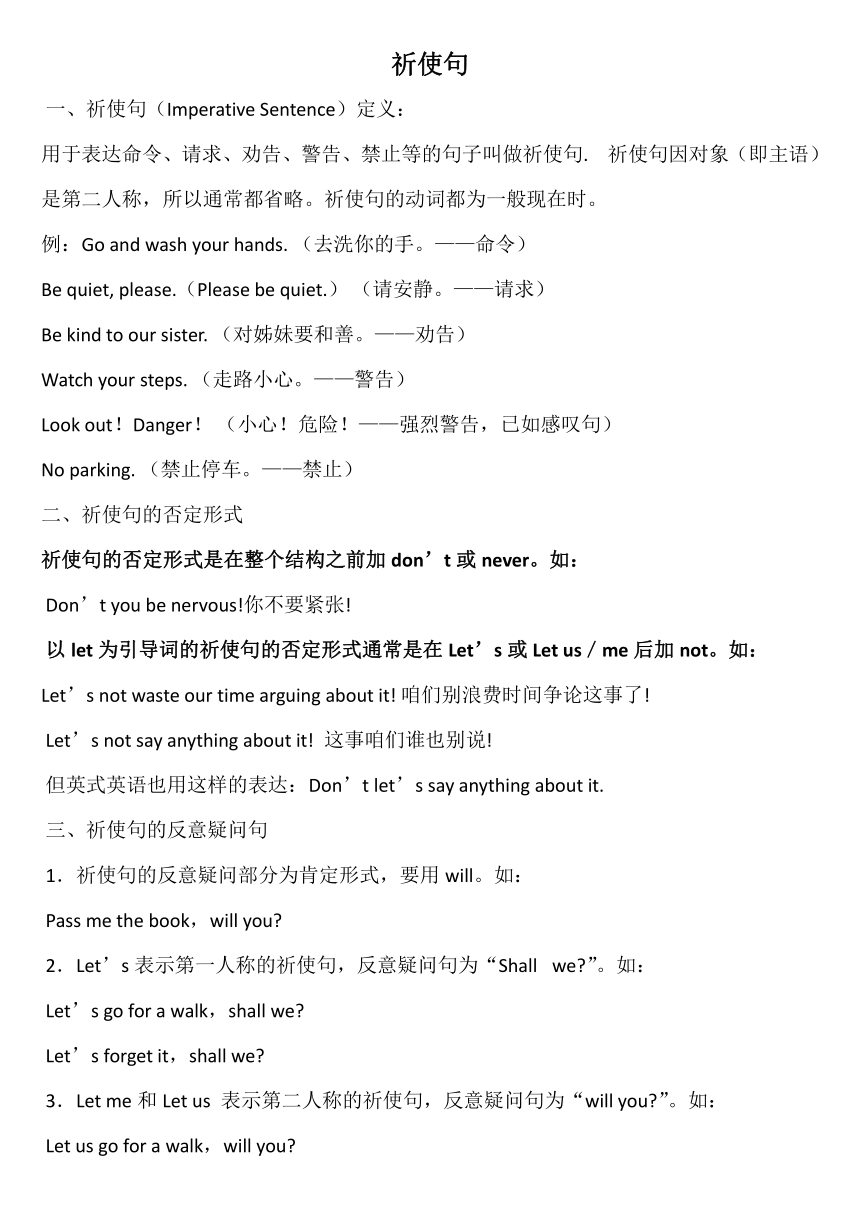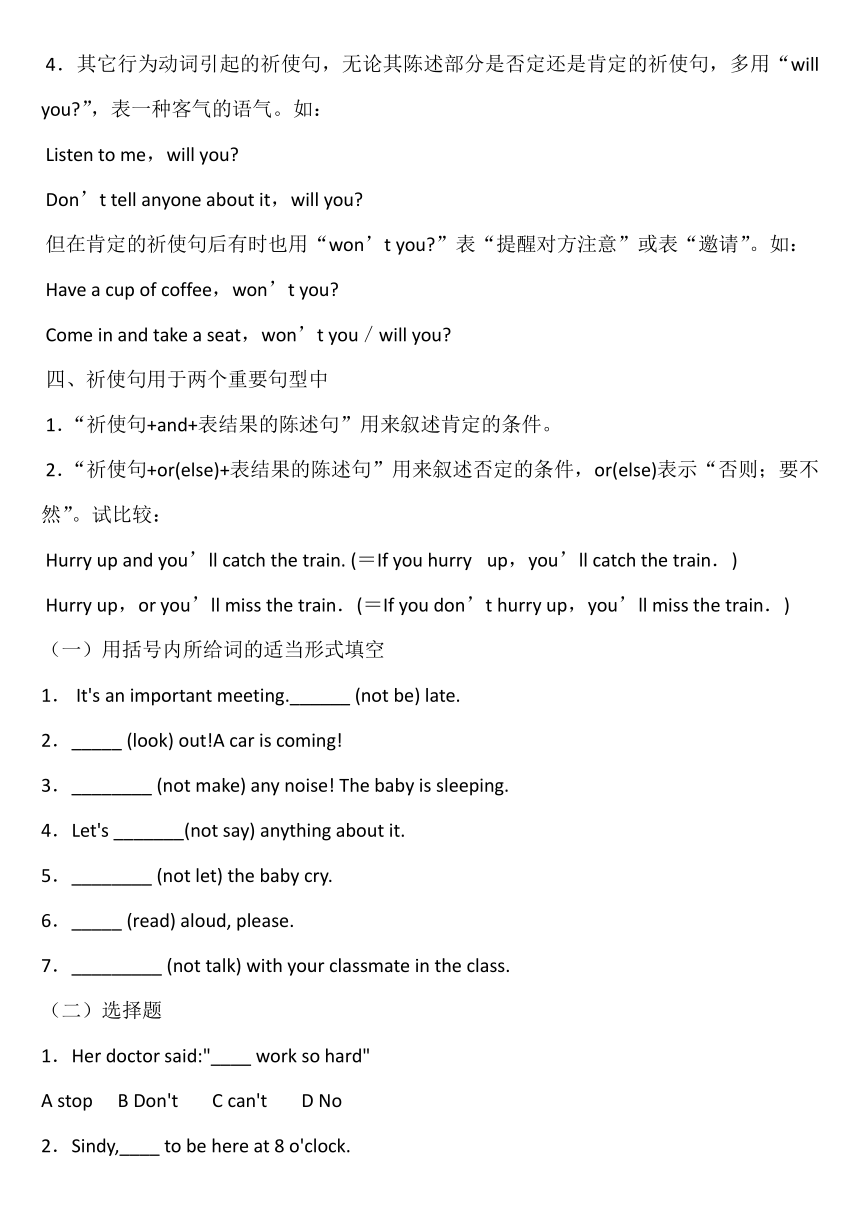2021小升初英语祈使句练习 (无答案)
文档属性
| 名称 | 2021小升初英语祈使句练习 (无答案) |

|
|
| 格式 | zip | ||
| 文件大小 | 25.0KB | ||
| 资源类型 | 教案 | ||
| 版本资源 | 其它版本 | ||
| 科目 | 英语 | ||
| 更新时间 | 2021-04-14 00:00:00 | ||
图片预览


文档简介
祈使句
?一、祈使句(Imperative?Sentence)定义:
用于表达命令、请求、劝告、警告、禁止等的句子叫做祈使句.??
祈使句因对象(即主语)是第二人称,所以通常都省略。祈使句的动词都为一般现在时。?
例:Go?and?wash?your?hands.?(去洗你的手。——命令)??
Be?quiet,?please.(Please?be?quiet.)?(请安静。——请求)???
Be?kind?to?our?sister.?(对姊妹要和善。——劝告)???
Watch?your?steps.?(走路小心。——警告)??
?
Look?out!Danger!?(小心!危险!——强烈警告,已如感叹句)????
No?parking.?(禁止停车。——禁止)??
??
二、祈使句的否定形式
祈使句的否定形式是在整个结构之前加don’t或never。如:?
?Don’t
you
be
nervous!你不要紧张!
?以let为引导词的祈使句的否定形式通常是在Let’s或Let
us/me后加not。如:
Let’s
not
waste
our
time
arguing
about
it!?咱们别浪费时间争论这事了!
?Let’s
not
say
anything
about
it!
这事咱们谁也别说!
?但英式英语也用这样的表达:Don’t
let’s
say
anything
about
it.
?三、祈使句的反意疑问句
?1.祈使句的反意疑问部分为肯定形式,要用will。如:
?Pass
me
the
book,will
you?
?2.Let’s表示第一人称的祈使句,反意疑问句为“Shall
?we?”。如:
?Let’s
go
for
a
walk,shall
we?
?Let’s
forget
it,shall
we?
?3.Let
me和Let
us
表示第二人称的祈使句,反意疑问句为“will
you?”。如:
?Let
us
go
for
a
walk,will
you?
?4.其它行为动词引起的祈使句,无论其陈述部分是否定还是肯定的祈使句,多用“will
you?”,表一种客气的语气。如:
?Listen
to
me,will
you?
?Don’t
tell
anyone
about
it,will
you?
?但在肯定的祈使句后有时也用“won’t
you?”表“提醒对方注意”或表“邀请”。如:
?Have
a
cup
of
coffee,won’t
you?
?Come
in
and
take
a
seat,won’t
you/will
you?
?四、祈使句用于两个重要句型中
?1.“祈使句+and+表结果的陈述句”用来叙述肯定的条件。?
?2.“祈使句+or(else)+表结果的陈述句”用来叙述否定的条件,or(else)表示“否则;要不然”。试比较:
?Hurry
up
and
you’ll
catch
the
train.
(=If
you
hurry
?up,you’ll
catch
the
train.)
?Hurry
up,or
you’ll
miss
the
train.(=If
you
don’t
hurry
up,you’ll
miss
the
train.)
(一)用括号内所给词的适当形式填空
1.?It's
an
important
meeting.______
(not
be)
late.
2._____
(look)
out!A
car
is
coming!
3.________
(not
make)
any
noise!
The
baby
is
sleeping.
4.Let's
_______(not
say)
anything
about
it.
5.________
(not
let)
the
baby
cry.
6._____
(read)
aloud,
please.
7._________
(not
talk)
with
your
classmate
in
the
class.?
(二)选择题
1.Her
doctor
said:"____
work
so
hard"
A
stop?
B
Don't??
?C
can't???
D
No
2.Sindy,____
to
be
here
at
8
o'clock.
A
is
sure?
B
is
sure
that?
?C
will
be
sure?
?D
be
sure
3._____
him
the
secret,
will
you?
A
Don't
tell??B
Not
to
tell?C
Not
telling??D
No
telling
4.Please
_____
look
outside,
look
at
the
blackboard.
A
not
B
don't???
?C
aren't???
D
can't
5.John,
read
the
text
for
us,_____
?
A
does
he?
B
will
he???
C
do
you??
?D
will
you
6.Let's
do
it
at
once,_____
?
A
shall
we
?B
will
you???
C
do
we???
?D
do
you
7.Let
us
do
it
at
once,____
?
A
shall
we?
B
will
you??
?C
do
we?
???D
do
you
8._____
in
bed,
It's
bad
for
your
eyes.
A
Not
to
read
B
Don't
read?
?C
Don't
to
read??
D
Not
read
9.____
smoking!
A
Don't??
B
No?
???C
Don't
to??
?D
Be
not
10.
The
TV
is
too
loud.
Please________.?
???A.
turn
it
down???B.
to
turn
it
down???C.
turn
down
it???D.
to
turn
down
it?
11.
_______
late
again,
Bill!?
??A.
Don't
to
be?????B.
Don't
be????????C.
Not
be???????D.
Be
not?
12.
Please
help
me
carry
it,
______??
??A.
will
I???B.
will
you????C.
shall
I?????D.
shall
we?
13.They
are
very
tired.
Why
________
have
a
rest????????????
???A
not
they????????B
do
not
they???????C
don’t
they???????D
not
to???
14.
Just
_________
to
him,
and
you
will
see
how
unusual
he
is!?
?A.
to
listen???B.
listen????C.
listened??????D.
listening?
15.
_________
the
footpath
and
you’ll
eventually
hit
the
road.?
?A.
Follow???????B.
Following???????C.
Followed??????D.
to
follow?
16.
_________
your
radio
down,
or
you’ll
wake
the
neighbors.?
?A.
Turning??????B.
To
turn????????C.
Having
turned??????D.
Turn?
17.
_________
a
bit
closer
and
you’ll
be
able
to
see
better.?
?A.
To
come?????B.
Coming????????C.
Having
come????????D.
Come?
18.
Make
sure
the
iron
isn’t
too
hot
_________
you’ll
burn
the
cloth.??
A.
and?????????B.
or??????????C.
yet?????????D.
so?
19.
Don’t
loosen
your
grip
on
the
rope
_________
you’ll
fall.??
A.
so?????????B.
and???????C.
or??????????D.
but?
20.
Come
on,
get
moving
_________
you’ll
be
late
for
school.??
A.
but??????B.
and???????????C.
or?????????D.
so?
21.
Be
quiet
or
you_________
the
whole
house!?
?A.
are
waking????B.
have
waken?????C.
will
wake????????D.
wake?
22.
Keep
to
the
path
or
you
_________
your
way.?
?A.
are
losing??????B.
have
lost??????C.
will
lose???????D.
lose?
?一、祈使句(Imperative?Sentence)定义:
用于表达命令、请求、劝告、警告、禁止等的句子叫做祈使句.??
祈使句因对象(即主语)是第二人称,所以通常都省略。祈使句的动词都为一般现在时。?
例:Go?and?wash?your?hands.?(去洗你的手。——命令)??
Be?quiet,?please.(Please?be?quiet.)?(请安静。——请求)???
Be?kind?to?our?sister.?(对姊妹要和善。——劝告)???
Watch?your?steps.?(走路小心。——警告)??
?
Look?out!Danger!?(小心!危险!——强烈警告,已如感叹句)????
No?parking.?(禁止停车。——禁止)??
??
二、祈使句的否定形式
祈使句的否定形式是在整个结构之前加don’t或never。如:?
?Don’t
you
be
nervous!你不要紧张!
?以let为引导词的祈使句的否定形式通常是在Let’s或Let
us/me后加not。如:
Let’s
not
waste
our
time
arguing
about
it!?咱们别浪费时间争论这事了!
?Let’s
not
say
anything
about
it!
这事咱们谁也别说!
?但英式英语也用这样的表达:Don’t
let’s
say
anything
about
it.
?三、祈使句的反意疑问句
?1.祈使句的反意疑问部分为肯定形式,要用will。如:
?Pass
me
the
book,will
you?
?2.Let’s表示第一人称的祈使句,反意疑问句为“Shall
?we?”。如:
?Let’s
go
for
a
walk,shall
we?
?Let’s
forget
it,shall
we?
?3.Let
me和Let
us
表示第二人称的祈使句,反意疑问句为“will
you?”。如:
?Let
us
go
for
a
walk,will
you?
?4.其它行为动词引起的祈使句,无论其陈述部分是否定还是肯定的祈使句,多用“will
you?”,表一种客气的语气。如:
?Listen
to
me,will
you?
?Don’t
tell
anyone
about
it,will
you?
?但在肯定的祈使句后有时也用“won’t
you?”表“提醒对方注意”或表“邀请”。如:
?Have
a
cup
of
coffee,won’t
you?
?Come
in
and
take
a
seat,won’t
you/will
you?
?四、祈使句用于两个重要句型中
?1.“祈使句+and+表结果的陈述句”用来叙述肯定的条件。?
?2.“祈使句+or(else)+表结果的陈述句”用来叙述否定的条件,or(else)表示“否则;要不然”。试比较:
?Hurry
up
and
you’ll
catch
the
train.
(=If
you
hurry
?up,you’ll
catch
the
train.)
?Hurry
up,or
you’ll
miss
the
train.(=If
you
don’t
hurry
up,you’ll
miss
the
train.)
(一)用括号内所给词的适当形式填空
1.?It's
an
important
meeting.______
(not
be)
late.
2._____
(look)
out!A
car
is
coming!
3.________
(not
make)
any
noise!
The
baby
is
sleeping.
4.Let's
_______(not
say)
anything
about
it.
5.________
(not
let)
the
baby
cry.
6._____
(read)
aloud,
please.
7._________
(not
talk)
with
your
classmate
in
the
class.?
(二)选择题
1.Her
doctor
said:"____
work
so
hard"
A
stop?
B
Don't??
?C
can't???
D
No
2.Sindy,____
to
be
here
at
8
o'clock.
A
is
sure?
B
is
sure
that?
?C
will
be
sure?
?D
be
sure
3._____
him
the
secret,
will
you?
A
Don't
tell??B
Not
to
tell?C
Not
telling??D
No
telling
4.Please
_____
look
outside,
look
at
the
blackboard.
A
not
B
don't???
?C
aren't???
D
can't
5.John,
read
the
text
for
us,_____
?
A
does
he?
B
will
he???
C
do
you??
?D
will
you
6.Let's
do
it
at
once,_____
?
A
shall
we
?B
will
you???
C
do
we???
?D
do
you
7.Let
us
do
it
at
once,____
?
A
shall
we?
B
will
you??
?C
do
we?
???D
do
you
8._____
in
bed,
It's
bad
for
your
eyes.
A
Not
to
read
B
Don't
read?
?C
Don't
to
read??
D
Not
read
9.____
smoking!
A
Don't??
B
No?
???C
Don't
to??
?D
Be
not
10.
The
TV
is
too
loud.
Please________.?
???A.
turn
it
down???B.
to
turn
it
down???C.
turn
down
it???D.
to
turn
down
it?
11.
_______
late
again,
Bill!?
??A.
Don't
to
be?????B.
Don't
be????????C.
Not
be???????D.
Be
not?
12.
Please
help
me
carry
it,
______??
??A.
will
I???B.
will
you????C.
shall
I?????D.
shall
we?
13.They
are
very
tired.
Why
________
have
a
rest????????????
???A
not
they????????B
do
not
they???????C
don’t
they???????D
not
to???
14.
Just
_________
to
him,
and
you
will
see
how
unusual
he
is!?
?A.
to
listen???B.
listen????C.
listened??????D.
listening?
15.
_________
the
footpath
and
you’ll
eventually
hit
the
road.?
?A.
Follow???????B.
Following???????C.
Followed??????D.
to
follow?
16.
_________
your
radio
down,
or
you’ll
wake
the
neighbors.?
?A.
Turning??????B.
To
turn????????C.
Having
turned??????D.
Turn?
17.
_________
a
bit
closer
and
you’ll
be
able
to
see
better.?
?A.
To
come?????B.
Coming????????C.
Having
come????????D.
Come?
18.
Make
sure
the
iron
isn’t
too
hot
_________
you’ll
burn
the
cloth.??
A.
and?????????B.
or??????????C.
yet?????????D.
so?
19.
Don’t
loosen
your
grip
on
the
rope
_________
you’ll
fall.??
A.
so?????????B.
and???????C.
or??????????D.
but?
20.
Come
on,
get
moving
_________
you’ll
be
late
for
school.??
A.
but??????B.
and???????????C.
or?????????D.
so?
21.
Be
quiet
or
you_________
the
whole
house!?
?A.
are
waking????B.
have
waken?????C.
will
wake????????D.
wake?
22.
Keep
to
the
path
or
you
_________
your
way.?
?A.
are
losing??????B.
have
lost??????C.
will
lose???????D.
lose?
